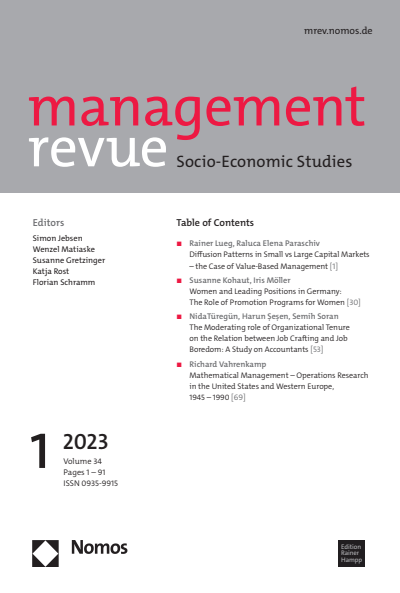批判灵性的综合评论
IF 1.7
0 MANAGEMENT
引用次数: 0
摘要
由于灵性为人们提供了生活的意义,并影响了他们的价值观和道德观,管理学者对这一研究领域的兴趣越来越大。人们天生就需要在生活和工作中找到意义。因此,管理理论和实践都面临着解决这些问题的挑战。其中一个争议是在管理理论和实践中讨论的是什么样的灵性。大多数出版物强调灵性的积极影响,因此认为它是一种改善员工和组织绩效的管理工具。相比之下,灵性的批判性方法侧重于关于生活和工作意义的严肃辩论,包括对组织和管理实践的批判性分析。虽然批判性灵性的研究跨越了一系列不同的学科,但仍然缺乏跨学科的系统分析。这个系统的回顾旨在通过整合来自不同学科的知识来呈现批判灵性的概述。它通过对最具影响力的理论基础和关键主题的综合概述,以及对管理理论和实践的影响框架,提供对灵性的理解,超越传统的管理观点,为管理话语做出了贡献。本文章由计算机程序翻译,如有差异,请以英文原文为准。
An Integrative Review of Critical Spirituality
As spirituality provides people with meaning in life and informs their sense of values and ethics, there is increasing interest among management scholars concerning this research field. People are characterised by an innate need to find meaning in their lives and work. Consequently, management theory and practice are challenged to address such topics. One controversy is the discussion of what kind of spirituality is debated in management theory and practice. The majority of publications emphasise the positive consequences of spirituality, thereby considering it as a management tool for improving the performance of employees and organisations. By contrast, critical approaches to spirituality focus on a serious debate about the meaning of life and work, including a critical analysis of organisations and managerial practices. Although research on critical spirituality spans a range of diverse disciplines, an interdisciplinary systematic analysis is still missing. This systematic review aims to present an overview of critical spirituality by integrating knowledge from diverse disciplines. It contributes to the management discourse by providing an understanding of spirituality beyond traditional management perspectives with a synthesised overview of the most influential theoretical foundations and key themes of critical spirituality as well as a framework of implications for management theory and practice.
求助全文
通过发布文献求助,成功后即可免费获取论文全文。
去求助
来源期刊

Management Revue
MANAGEMENT-
CiteScore
1.20
自引率
0.00%
发文量
7
期刊介绍:
Management Revue - Socio-Economic Studies is an interdisciplinary European journal that undergoes peer review. It publishes qualitative and quantitative work, along with purely theoretical papers, contributing to the study of management, organization, and industrial relations. The journal welcomes contributions from various disciplines, including business and public administration, organizational behavior, economics, sociology, and psychology. Regular features include reviews of books relevant to management and organization studies.
Special issues provide a unique perspective on specific research fields. Organized by selected guest editors, each special issue includes at least two overview articles from leaders in the field, along with at least three new empirical papers and up to ten book reviews related to the topic.
The journal aims to offer in-depth insights into selected research topics, presenting potentially controversial perspectives, new theoretical insights, valuable empirical analysis, and brief reviews of key publications. Its objective is to establish Management Revue - Socio-Economic Studies as a top-quality symposium journal for the international academic community.
 求助内容:
求助内容: 应助结果提醒方式:
应助结果提醒方式:


